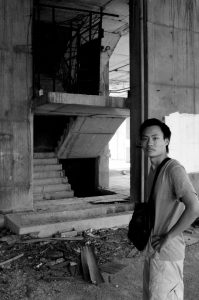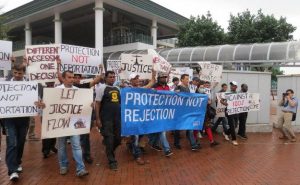Memo #232
By Tim Yu – yutimothy [at] ualberta.ca
 Recent demonstrations protesting Hong Kong’s zero-recognition refugee policy in April 2013 brought renewed attention to a crisis situation regarding asylum seekers in the territory. Since 2004, 12,300 asylum seekers have filed claims with Hong Kong’s Immigration Department asking to be allowed to remain on the grounds that they face torture if returned to their countries, but only one has ever been granted refugee status. Hong Kong’s refugee recognition rates are well below the international average of 13.8% reported by the United Nations, and the 20% to 38% recognition rate in liberal democracies.
Recent demonstrations protesting Hong Kong’s zero-recognition refugee policy in April 2013 brought renewed attention to a crisis situation regarding asylum seekers in the territory. Since 2004, 12,300 asylum seekers have filed claims with Hong Kong’s Immigration Department asking to be allowed to remain on the grounds that they face torture if returned to their countries, but only one has ever been granted refugee status. Hong Kong’s refugee recognition rates are well below the international average of 13.8% reported by the United Nations, and the 20% to 38% recognition rate in liberal democracies.
Hong Kong has around 7,000 recognized asylum seekers, with the majority coming from South Asia and Africa. Many asylum seekers are forced to rely upon HK$1,200 per month ($160 CAD) in government handouts, and can wait up to four years for a refugee-status determination (RSD).
Hong Kong is bound by the UN Convention Against Torture (CAT), but although China ratified the 1951 UN Refugee Convention in 1982, it has not extended the treaty to Hong Kong. As a result, Hong Kong lacks an adequate refugee policy: it has adopted a separate screening mechanism for reviewing torture claims—since CAT bars refoulement (return) of refugees who could face torture—but leaves the United Nations High Commission for Refugees to carry out all RSD procedures for other asylum seekers.
Human rights activists and NGOs have argued that Hong Kong has a legal obligation to improve screening procedures, and have criticized the government for a lack of real commitment to ensuring non-refoulement of those facing torture. Government officials have insisted that, if the Refugee Convention were to be extended to Hong Kong, the territory would become a magnet for illegal migrants posing as asylum seekers.
Hong Kong needs a comprehensive strategy for addressing its asylum seeker crisis. A landmark ruling by Hong Kong’s Court of Final Appeal in March 2013 has ordered the government to create a new system for evaluating torture and refugee claims, but this has yet to happen. The potential benefits of reforming Hong Kong’s refugee policies to meet international standards far outweigh the costs of maintaining the status quo.
About the Author:
Tim Yu is an undergraduate student at the University of Alberta.

An April demonstration by asylum seekers and their supporters added to the pressure on the Hong Kong government to produce a workable policy for screening refugees. Photos: http://visionfirstnow.org/
Links:
- Protestors in Hong Kong Demand Better System for Asylum Seekers, The Globe and Mail, April 27, 2013.
- Open and shut cases, South China Morning Post, March 29, 2012.
- Don’t starve refugees of the fruit of honest labour, South China Morning Post, May 1, 2013.
- How we fail our refugees, Time Out Hong Kong, March 13, 2012.
- Asylum Seekers Wait, and Learn, in Hong Kong, New York Times, June 27, 2012.
Related Memos:
- See our other memos on Hong Kong
[…] Read at the UBC Asia-Pacific Memo. […]
[…] Read at the UBC Asia-Pacific Memo. […]
[…] Yu writes for The National Conversation, the Asia Pacific Memo and Embassy […]